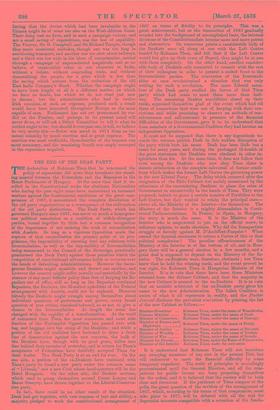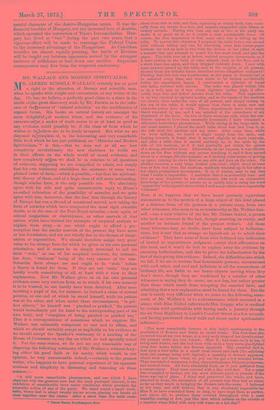THE END OF THE DEAK PARTY.
THE declaration of Koloman Tisza that he renounced the policy of separatism did more than terminate the stand- ing quarrel between the Federalists and the Repealers in the Home Parliament of Hungary. At the same time that it en- rolled in the Constitutional ranks the obstinate Nationalists who during the past eight years have maintained an incessant warfare against the fundamental conditions of the great com- promise of 1867, it necessitated the complete dissolution of the old party organisations as a consequence of the obliteration of the old party distinctions. The Desk Party, which has governed Hungary since 1867, was never so much a homogene- -ow political association as a coalition of widely-divergent parties, bound together by little but a common recognition of the importance of not undoing the work of reconciliation with Austria. So long as a vigorous Opposition made the rupture of that reconciliation the primary point of its pro- gramme the impossibility of entering into any relations with Irreconchables, as well as the impossiblity of Irreconcilables being summoned to the Council of the Sovereign, practically guaranteed the Deak Party against those penalties which the competition of constitutional adversaries holds in terrorem over the heads of defaulting administrations. However the incon- gruous Deakists might squabble and thwart one another, and however the country might suffer morally and materially by the absence of any more definite policy than that of keeping the Re- Feelers out of office, still so long as the Repealers continued Repealers, the Deakists, the ill-sorted upholders of the Federal arrangement with Austria, could not be replaced. However bitterly the Deakists might wrangle among themselves about individual questions of preferment and power, every broad 'question of true reform remained tabooed, so as not to give a -chance to the Irreconcilables. At length the scene has -changed with the rapidity of a transformation. At the word of command from Tisza, the most numerous and most able fraction of the Nationalist Opposition has passed over with bag and baggage into the camp of the Deakists; and while a portion of the old coalition have hastened to draw a fresh line of demarcation against the new converts, the bulk of the Deakists have, though with no good grace, fallen into line behind their enemies of yesterday, and in return for Tisza's acceptance of Federalism have dutifully accepted Tisza for their leader. The Deal Party is at an end for ever. On the one side, a portion of the ex-Deakists have coalesced with Tisza's party to found a new party under the common name of "Liberals," and a new Club whose head-quarters will be the Hotel Hungaria. On the other side, the Deakist sections, which used to group themselves around Count Lonyay and Baron Sennyey, have drawn together as the Liberal-Conserva- tive party.
In fact, there could be no other result of the situation. 'Desk had got together, with vast expense of tact and ability, a majority pledged to work the constitutional arrangement of
1867 on terms of fidelity to its principles. This was a great achievement, but as the transaction of 1667 gradually receded into the background of accomplished facts, the internal divisions of the Constitutionalists became more and more patent and obstructive. On numerous points a considerable body of the Deakists were all along at one with the Left Centre headed by Koloman Tisza, and felt that if the Left Centre would but give up their craze of Repeal, they might be stone with them completely. On the other hand, another consider- able body of Deakists only consented to consort with the rest of their colleagues in order to present a united front to the
Irreconcilable parties. The conversion of the Irreconcil- shies at once revolutionised a situation that was only waiting for such a revolution. The more Liberal mem- bers of the Desk party swelled the forces of that Time party which had come to meet them more than half- way. The remaining Deakist notabilities closed up their ranks, expressed themselves glad of the event which had rid them of connections that were out of keeping with their con- victions, and while promising to observe an attitude of con- siderateness and self-restraint in presence of the financial difficulties of the Government, gave it to be understood that from members of a Governmental Coalition they had become an independent Opposition.
It must not be supposed that there is any ingratitude to- wards the veteran patriot Desk in this sudden disruption of the party which bore his name. Dealt has been little but a name for many years, and during the prolonged ill-health of the great statesman the Deakists were obedient to other in- spirations than his. At the same time, it does not follow that even among the Deakists who now obey Tisza there is sincere satisfaction at the complete subvereal of former condi- tions which makes the former Left Centre the governing power in the new Liberal Party. The delay which occurred after the resignation of the Bitto Cabinet was mainly ea/maimed by the reluctance of the surrendering Deakists to place the reins of Government so unreservedly in the hands of Tisza. They were prepared, indeed, to grant a certain number of Portfolios to the Left Centre, but they wanted to retain the principal ones— above all, the Ministry of the Interior—for themselves. The Ministry of the Interior is a mighty Abracadabra in Conti- nental Parliamentarisms. In France, in Spain, in Hungary, the story is ranch the same. It is the Minister of the Interior who is empowered to put on the official screw, to influence opinion, to make elections. Why did the Bonapartists struggle so fiercely against M. D'Audiffret-Pasquier ? What caused the Spanish electorate to return a Cortes of this or that political complexion ? The peculiar efficaciousness of the Ministry of the Interior is at the bottom of all, and in Hun- gary there will be a general election in a few months, and a great deal is supposed to depend on the Ministry of the In- terior. The ex-Deakists were, therefore, obstinate ; but Tisza knew that he held the winning cards, and the event proved he was right, for Koloman Time is Hungarian Minister of the Interior. It is in vain that there have been three Ministers retained from the defunct Cabinet, and that the majority in the new Cabinet is assured to the ex-Deakists. It is in vain that an amiable aristocrat of the ex-Deakist party gives his name to the new Administration. The fallen Coalition is aware of what it all represents in reality, and the Father Journal discloses the prevalent conviction by printing the list of the new Cabinet as follows:— It is- understood that Koloman Tisza will not_ introduce any sweeping measures of any sort in the present Diet, but will endeavour to meet the financial difficulty by some temporary expedient. The strife of principles is accordingly procrastinated until the General Election, and all the com- petitors for public favour are busy preparing themselves for the ordeal, and it is believed that the contest will be both close and strenuous. If the partisans of Tisza conquer at the polls, the great question of the revision of the arrangement of 1867, which, according to the terms of that compromise, must take place in 1877, will be debated with all the zeal for 'Separatist interests compatible with a retention of the funda,-
Minister-President Finance Minister Minister of Commerce Minister of Routes and Highways Minister of Justice Minister of Worship Minister of War Minister for Croatia Minister of the Interior
Koloman Tisza, under the name of Fermat. Koloman Tisza, under the name of Trefort. Koloman Tisza, under the name of Szende. Koloman Tisza, under thelame of Pojacsewies. Koloman Tisza, under his own name.
Koloman Tisza, under the name of Wenoltheim.
Koloman Tisza, under the name of Szell. Koloman Tisza, under the mune of Simonyi.
Koloman Tisza, under the name of Pechy.
mental character of the Austro-Hungarian union. It was the i financial troubles of Hungary, not any increased love of Austria, which operated the conversion of Tisza's Irreconcilables. Hun- gary has lived so " fast " during the past two years, that a vigorous effort will be made to rearrange the Federal Union to the increased advantage of the Hungarians. As Cisleithan troubles are almost equally pressing, the battle of Revision will be fought out between opponents nerved by the strongest instincts of selfishness to beat down one another. Important consequences may flow from the reopened controversy.



































 Previous page
Previous page